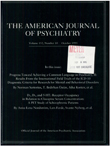Decreased cerebral response to inhibitory neurotransmission in alcoholics
Abstract
OBJECTIVE: Changes in gamma-aminobutyric acid (GABA)-benzodiazepine receptor function have been implicated in alcohol tolerance, withdrawal, and dependence. The purpose of this study was to investigate whether recently detoxified alcoholic subjects had abnormalities in brain GABA-benzodiazepine receptor function. METHOD: The effect of 30 micrograms/kg of lorazepam on regional brain glucose metabolism was studied in 12 normal subjects and 10 alcoholic subjects with the use of positron emission tomography and [18F]fluorodeoxyglucose. RESULTS: Lorazepam decreased whole brain glucose metabolism in both the normal subjects (13% change) and the alcoholic subjects (10% change), and the response was correlated with the concentration of lorazepam in plasma. Whereas the normal and alcoholic subjects showed similar responses to lorazepam in occipital and cerebellar metabolism, the alcoholic subjects showed significantly less of a response than the comparison subjects in the thalamus, basal ganglia, and orbitofrontal cortex. The rate of response in the orbitofrontal cortex was significantly correlated with cerebellar metabolism at baseline. CONCLUSIONS: The alcoholic subjects had a blunted response to lorazepam that was specific to certain brain regions. The association between cerebellar metabolism and response to lorazepam suggests that the cerebellum may contribute to the decreased sensitivity to lorazepam which was seen in the alcoholic subjects.
Access content
To read the fulltext, please use one of the options below to sign in or purchase access.- Personal login
- Institutional Login
- Sign in via OpenAthens
- Register for access
-
Please login/register if you wish to pair your device and check access availability.
Not a subscriber?
PsychiatryOnline subscription options offer access to the DSM-5 library, books, journals, CME, and patient resources. This all-in-one virtual library provides psychiatrists and mental health professionals with key resources for diagnosis, treatment, research, and professional development.
Need more help? PsychiatryOnline Customer Service may be reached by emailing [email protected] or by calling 800-368-5777 (in the U.S.) or 703-907-7322 (outside the U.S.).



